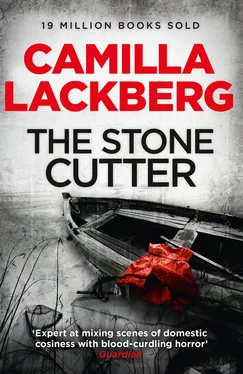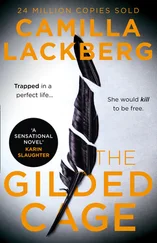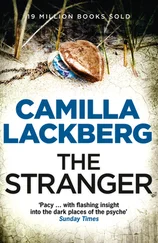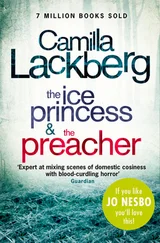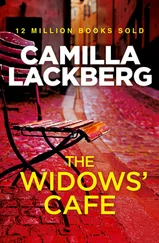Martin looked up from his notebook with a frown. ‘A problem with all the initials? What do you mean by that?’
‘You know, one of those things that every other child seems to have these days: ADHD, DAMP, MBD, and whatever else they’re called.’
‘Why do you think something was wrong with Sara?’
She shrugged. ‘People talked. And I thought it fit quite well. Sara could be utterly impossible to deal with, so either she was suffering from some problem or else she hadn’t been brought up right.’ She cringed as she heard herself talking about a dead girl that way, and quickly looked down. With even greater frenzy she resumed tearing up the napkin, and soon there was nothing left of it.
‘So you never saw Sara at all this morning? And never heard from her by phone either?’
Veronika shook her head.
‘And you’re sure the same is true for Frida?’
‘Yes, she’s been at home with me the whole time, so if she had talked to Sara I would have known. And she was a bit peeved that Sara never showed up, so I’m quite sure they didn’t talk to each other.’
‘Well then, I don’t suppose we have much more to ask you.’
With a voice that quavered a bit Veronika asked, ‘How is Charlotte doing?’
‘As can be expected under the circumstances,’ was the only answer Patrik could give her.
In Veronika’s eyes he saw the abyss open that all mothers must experience when for an instant they picture their own child a victim of an accident. And he also saw the relief that this time it was someone else’s child and not her own. He couldn’t reproach her for feeling that way. His own thoughts had all too often shifted to Maja in the past hour. Visions of her limp and lifeless body had forced their way in and made his heart skip a few beats. He too was grateful that it was someone else’s child and not his own. The feeling may not have been honourable, but it was human.
He made a practised judgement of where the stone would be easiest to cleave and then brought the hammer down on the chisel. Quite rightly, the granite split precisely where he had calculated it would. Experience had taught him well over the years, but natural talent was also a large part of it. You either had it or you didn’t.
Anders Andersson had loved the stone since he had first come to work at the quarry as a small boy, and the stone loved him. But it was a profession that took its toll on a man. The granite dust bothered his lungs more and more with each passing year, and the chips that flew from the stone could ruin a man’s eyesight in a day, or cloud his vision over time. In the cold of winter it was impossible to do a proper job wearing gloves, so his fingers would freeze until they felt like they would fall off. In the summer he would sweat profusely in the broiling heat. And yet there was nothing else he would rather do. Whether he was cutting the four-inch cubic paving stones called ‘two-örings’ used to construct roads, or had the privilege of working on something more advanced, he loved every laborious and painful minute. He knew this was the work he was born to do. His back already ached at the age of twenty-eight, and he coughed interminably at the least dampness, but when he focused all his energy on the task before him, his ailments were forgotten and he would feel only the angular hardness of the stone beneath his fingers.
Granite was the most beautiful stone he knew. He had come to the province of Bohuslän from Blekinge, as so many stonecutters had done over the years. The granite in Blekinge was considerably more difficult to work with than in the regions near the Norwegian border. Consequently the cutters from Blekinge enjoyed great respect thanks to the skill they had acquired by working with less tractable material. Three years he had been here, attracted by the granite right from the start. There was something about the pink colour against the grey, and the ingenuity it took to cleave the stone correctly, that appealed to him. Sometimes he talked to the stone as he worked, cajoling it if it was an unusually difficult piece, or caressing it lovingly if it was easy to work and soft like a woman.
Not that he lacked offers from the genuine article. Like the other unmarried cutters he’d had his amusements when the occasion presented itself, but no woman had attracted him so that his heart leaped in his breast. He’d learned to accept that. He got along fine on his own. He was also well-liked by the other lads in his crew, so he was often invited home for a meal prepared by a woman’s hand. And he had the stone. It was both more beautiful and more faithful than most of the women he had encountered. He and the stone had a good partnership.
‘Hey, Andersson, can you come over here for a moment?’
Anders interrupted his work on the big block and turned round. It was the foreman calling him, and as always he felt a mixture of anticipation and alarm. If the foreman wanted something from you, it was either good news or bad. Either an offer of more work, or notification that you could go home from the quarry with your cap in hand. In fact, Anders believed more in the former alternative. He knew that he was skilled at his profession, and there were probably others who would get the boot before him if the workforce were cut back. On the other hand, logic did not always win out. Politics and power struggles had sent home many a good stonecutter, so nothing was ever guaranteed. His strong involvement in the trade-union movement also made him vulnerable when the boss had to get rid of people. Politically active cutters were not appreciated.
He cast a final glance at the stone block before he went to see the foreman. It was piecework, and every interruption in his work meant lost income. For this particular job he was getting two öre per paving stone, hence the name ‘two-örings’. He would have to work hard to make up for lost time if the foreman was long-winded.
‘Good day, Larsson,’ said Anders, bowing with his cap in hand. The foreman was a stern believer in protocol. Failing to show him the respect he felt he deserved had proven to be reason enough for dismissal.
‘Good day, Andersson,’ muttered the rotund man, tugging on his moustache.
Anders waited tensely for what would come.
‘Well, it’s like this. We’ve got an order for a big memorial stone from France. It’s going to be a statue, so we thought we’d have you cut the stone.’
His heart hammered with joy, but he also felt a stab of fright. It was a great opportunity to be given the responsibility to cut the raw material for a statue. It could pay a great deal more than the usual work, and it was both more fun and more challenging. But at the same time it was an enormous risk. He would be responsible until the statue was shipped off, and if anything went wrong he wouldn’t be paid a single öre for all the work he had done. There was a legend about a cutter who had been given two statues to cut, and just as he was in the final stages of the work he made a wrong cut and ruined them both. It was said that he’d been so despondent that he took his own life, leaving behind a widow and seven children. But those were the conditions. There was nothing he could do about it, and the opportunity was too good to pass up.
Anders spat in his hand and held it out to the foreman, who did the same so that their hands were united in a firm handshake. It was a deal. Anders would be in charge of the work on the memorial stone. It worried him a bit what the others at the quarry would say. There were many men who had considerably more years on the job than he did. Some would undoubtedly complain that the commission should have gone to one of them, especially since unlike him they had families to support. They would have viewed the extra money as a welcome windfall with winter coming on. At the same time they all knew that Anders was the most skilled stonecutter of them all, even as young as he was. That consensus would dampen most of the backbiting. Besides, Anders would choose some of them to work with him, and he had previously shown that he could wisely weigh the pros and cons of who was most skilled and who was in greatest need of extra income.
Читать дальше
